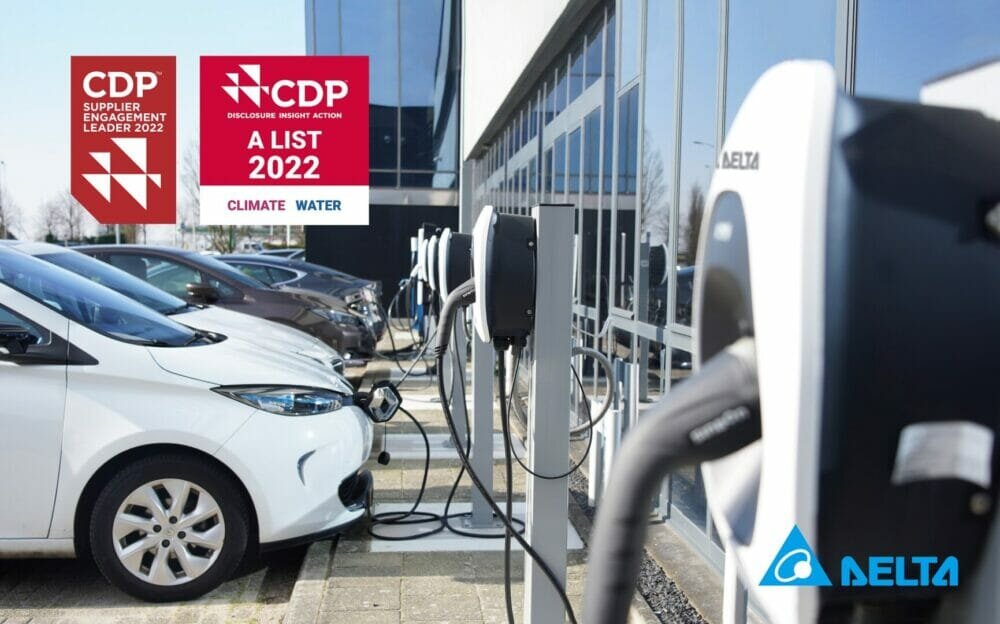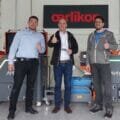CDP recently announced their 2022 Supplier Engagement Rating (SER), and named Delta the “Supplier Engagement Leader” with the highest scores, “A” rating, in key rating categories such as “Overall CDP Climate Change Performance”, “Supply Chain Engagement” and “Scope 3 Emissions”.
This is the third consecutive year that CDP has recognized Delta as Supplier Engagement Leader, after awarding Delta the Double A List Rating on “Climate Change” and “Water Security” last year. Delta’s efforts and action on climate issues are once again recognized by indicative assessment.
Jesse Chou, chief sustainability officer of Delta, stated that Delta has long been concerned about climate change and global warming, while proactively participating in international sustainability initiatives, and implementing energy-saving projects in daily operations. In 2021, Delta achieved its SBT target ahead of schedule and today the proportion of renewable electricity used at Delta’s global sites has reached 55%. Based on this achievement, Delta is committed to reaching RE100 and carbon neutrality by 2030 and has established a long-term strategy with plans to achieve net zero emissions by 2050 in response to global efforts to control global warming in line with the 1.5°C pathway. This makes Delta the first company in the technology hardware and equipment industry in Asia and the 125th company in the world to have passed the SBTi’s net-zero science-based target review*1.
To achieve the long-term target of net zero emissions in 2050, Delta has set a target to reduce Scope 3 emissions*2 by 25% in 2030 compared with a base year of 2021. Delta also strives to create a sustainable supply chain and demands its tier 1 suppliers to meet the ISO14064-1 greenhouse gas emissions standard by 2025. In addition to regularly providing ESG training for suppliers, Delta leads suppliers in carrying out carbon inventory, collaborates with more than 90% of its tier 1 suppliers every year on climate change related issues, and provides their energy-saving and carbon reduction experience to help suppliers implement carbon reduction. Delta also promotes a supply chain sustainability plan, helping long-term suppliers with energy-saving diagnosis and improvement, and at the same time promoting Delta’s energy-saving products and solutions in the process. Delta’s technical expertise has helped a semiconductor manufacturer implement energy-saving improvements with an overall investment of US$1.8 million and an annual electricity savings of 14 million kWh, equivalent to an annual savings of US$1.15 million*3.
Each year, Delta calculates the manufacturing carbon footprint for nearly 40 customers participating in the CDP supply chain program and provides energy-saving technologies and carbon reduction benefits to reduce greenhouse gas emissions at each manufacturing step. From 2010 to 2021, Delta’s high-efficiency products have helped global customers save a total of 35.9 billion kilowatt-hours of electricity, which is equivalent to reducing 19.01 million tons of carbon emissions. Since 2015, 11 energy-saving products shipped by Delta, including electronic ballasts, server power supplies, photovoltaic inverters, electric vehicle DC chargers, have been successively verified by ISAE 3000, demonstrating actual results in helping customers in carbon reduction. In addition, Delta’s main production plants were 100% compliant with ISO
14064-1 certification in both the scope 1 and scope 2 greenhouse gases emissions in 2021, and scope 3 has also been certified by a third party. The manufacturing plants and buildings have also implemented 80 water-saving programs and 64 waste reduction measures, saving a total of 165.8 thousand tons of water and 3,986 metric tons of waste*3. All of Delta’s climate actions and actual results are in line with CDP SER’s target of carbon reduction through supplier engagement.
CDP’s annual environmental disclosure and scoring is recognized as an important standard for the transparency of corporate environmental sustainability. Its supply chain program has about 280 major members, with a total procurement expenditure of up to US$6.4 trillion. CDP conducts its annual SER assessment using each company’s response to questions on governance, targets, Scope 3 emissions, overall climate change project performance, and supply chain engagement in the CDP Climate Change questionnaire with companies on a supply chain program. In 2022, more than 18,500 companies participated in CDP disclosure.
Note 1. The net-zero SBT set by Delta was approved by SBTi in December 2022 where the long-term target is to reduce Scope 1+2+3 greenhouse gas emissions by 2050 with the base year of 2021. At the same time, Delta establishes a new short-term target based on the 1.5°C pathway including a reduction of Scope 1+2 emissions by 90% in 2030, and a reduction of Scope 3 emissions by 25% compared with the base year of 2021, which is stricter than the SBTi 1.5°C requirement to reduce Scope 1+2 emissions by 42% in 2030.
Note 2. Scope of Greenhouse Gas Emissions (Scope 1-3):
– Scope 1: Direct emissions from the sources owned or controlled by an organization (such as diesel, gasoline, or natural gas)
– Scope 2: Indirect emissions from an organization’s purchased electricity
– Scope 3: Other indirect emissions from the upstream and downstream organizational activities of a company’s supply chain
Note 3. Please refer to the 2021 Delta Electronics ESG Report.
For detailed information about Delta, please visit: www.delta-emea.com







